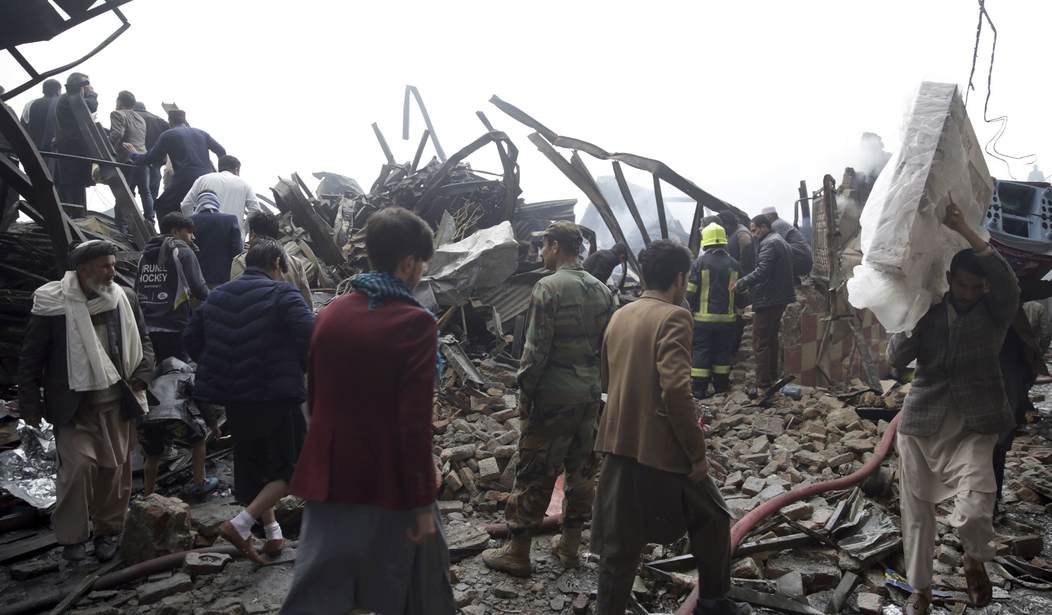Yesterday marked the “official” end of a three-day ceasefire in Afghanistan, supposedly declared in observance of the Islamic holiday of Eid-al-Fitr. Of course, it really wasn’t a ceasefire at all. For the entire three days, there had been continual violence. On Friday, a mosque north of Kabul was bombed killing a dozen people. Much of the capital was left in the dark after multiple power stations were blown up. The local ISIS contingent took credit for all of those attacks, but telling the difference between them, the remaining al Qaeda elements and the Taliban’s own militants is frequently difficult. Still, there were at least some efforts to work out a temporary halt to most of the violence as the United States and our allies prepare to depart. (Associated Press)
A three-day cease-fire marked by violent attacks — most claimed by the Islamic State group — ended Sunday in Afghanistan amid calls for renewed peace talks between the government and Taliban.
Taliban political spokesman Suhail Shaheen said the negotiating teams of the government and the Islamic Emirate, as the Taliban refer to their ousted regime, met briefly Saturday in the Middle Eastern State of Qatar. They renewed their commitment to finding a peaceful end to the war and called for an early start to talks that have been stalled, he said.
The U.S. has been pressing for accelerated talks as it withdraws the last of its 2,500-3,500 soldiers and NATO its remaining 7,000 allied forces.
As we’ve noted here repeatedly, the negotiations that have been ongoing with the Taliban in Qatar are largely pointless. They rarely live up to their word unless it concerns something that directly benefits them. And even if the negotiators try to make promises in good faith, they don’t control the various bands of militants around the country acting in their name. And then there are the aforementioned terror groups that are still active in the country and answer to no one. You can’t make much progress in peace negotiations when you’re talking to ghosts and powerless actors.
Meanwhile, there are thousands of Afghans who have helped the United States and our allies as translators, informants and general laborers. When we are gone, if they are still in the country, they will have a huge target on their backs and nobody will be left to protect them. They are well aware of this and have been begging for help.
He served as an interpreter alongside U.S. soldiers on hundreds of patrols and dozens of firefights in eastern Afghanistan, earning a glowing letter of recommendation from an American platoon commander and a medal of commendation.
Still, Ayazudin Hilal was turned down when he applied for one of the scarce special visas that would allow him to relocate to the U.S. with his family. Now, as American and NATO forces prepare to leave the country, he and thousands of others who aided the war effort fear they will be left stranded, facing the prospect of Taliban reprisals.
“We are not safe,” the 41-year-old father of six said of Afghan civilians who worked for the U.S. or NATO. “The Taliban is calling us and telling us, ’Your stepbrother is leaving the country soon, and we will kill all of you guys.’”
Ayazudin Hilal is far from the only one in this position. He worked helping the American and NATO forces for more than a decade. As an educated, bilingual Afghan, he was seen as a critical resource in a region where few of our forces speak the local language and even fewer of the natives speak English. But when the time came to apply for a visa to move his family to the United States, he was turned down.
I’m not writing this column to oppose our withdrawal from Afghanistan. It’s time to come home. Actually, it was time to come home as soon as Osama bin Laden’s body went into the ocean. And I’m also not claiming we should simply forget about our visa screening requirements and create an open-door emigration policy. As we’ve seen far too often and at a great cost paid in blood, the Taliban and the various terror groups in that country have embedded their own moles among our “helpers” who regularly show up and detonate bombs or go on shooting sprees.
So is there a solution that saves our helpers but still gets us out of this war? Possibly, but a lot of people won’t like it. We could organize a mass exodus to another country and set up secure detention centers where they could live while we do all of the background checks and determine if they are eligible to come to the United States. We’ve used Egypt for things like this in the past. For that matter, we could send them to Gitmo while their applications are processed. We might as well get some use out of it.
Somehow I doubt that’s going to happen, though. Eventually, the last planes and choppers will take off and these people will be left behind. And then the Taliban will overthrow the government we helped establish and the slaughter will begin. I would dearly love to be wrong about this, but it seems as predictable as the changing of the seasons.








Join the conversation as a VIP Member